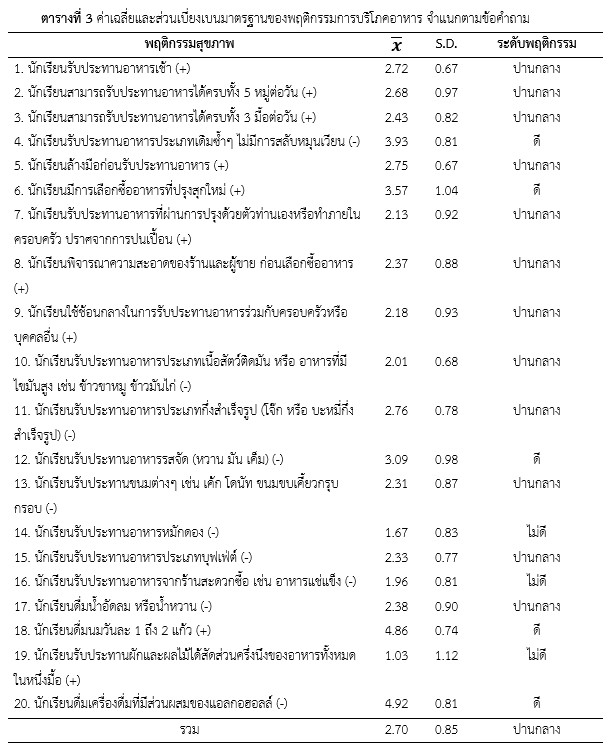KNOWLEDGE, ATTITUDE AND FOOD CONSUMPTION BEHAVIOR AMONG SECONDARY SCHOOL STUDENTS IN BANGKOK.
Main Article Content
Abstract
The purpose of this research was to study the knowledge, attitude, and food consumption behavior of secondary school students in Bangkok. The method of conducting this research was a survey research. The tool used is divided into 4 parts: the general information questionnaire. Food Knowledge Quiz The food consumption attitude questionnaire and the total food consumption behavior questionnaire consisted of 64 questions. 500 high school students in Bangkok. The research results are as follows:
1) Secondary school students in Bangkok had a moderate level of knowledge about food consumption.
2) Secondary school students in Bangkok had good attitudes about food consumption.
3) Secondary school students in Bangkok had moderate food consumption behavior.
Article Details

This work is licensed under a Creative Commons Attribution-NonCommercial-NoDerivatives 4.0 International License.
References
Buason Rattana et al., (2012). Thai Song Dam health lifestyle from yesterday to the sufficiency health era. Journal of Education Naresuan University. 14(1), 17-28.
National Statistical Office, Ministry of Digital Economy and Society (2018). Summary of key results of the survey the use of information and communication technology in the household, B.E. 2018 (Quarter 1). Bangkok.
Pongutta Suladda and Watinee Khunpueak, (2015). Food and Nutrition in Thailand: Where We Are Now (annual report). Nonthaburi: Food Policy Research Plan Nutrition for health promotion Foundation for International Health Policy Development Ministry of Public Health.
Poonnawitch Chirawuth et al., (2016). Food consumption behavior of primary school students 4-6 a school in Thawi Watthana District, Bangkok.search on 30 April 2020. From: http://www.bkkthon.ac.th.
No-in Kalayanee, (2017). Overweight and obesity in school age and Thai adolescents. Royal Thai Army Nursing Journal. 18: 1-8.
Warachit Phaijit, (2010). Health survey results reveal more and more people are obese. Post Today 19 June 2010: Page 6.
Toojinda Chanika, (2020). More than 5 million Thai elementary and high school students are obese. search on 14 April 2020.From: http://www.thaihealth.or.th/node/15598.
Moongwongsa Orawan and Khengwa Kulwadee, (2019). Factors related to food consumption behavior of high school students at Wat Chantrawat School (Sukprasarnrat), Phetchaburi Province. Journal of Hua Hin Suk Jai Klai Kangwon.
Methanon Sophon, (2019). Department of Health reveals that Thai children buy snacks 9,800 baht per year. Daily News, 23 September 2009: Page 1.
Division of Health Education. (2015). Modification of food consumption behavior for working age, Nonthaburi: Department of Health Education Division.
PrasitNarapan Boonrit et al. (2017). Factors predicting food consumption behavior of Students Grade 4-6. Journal of Boromarajonani College of Nursing, Uttaradit. Year 9 Issue 2: July - December 2017.
Suwanna Chiangkhunthod and team. (2014). Knowledge and food consumption behavior of people in Phasi Charoen District, Bangkok (Research report). Bangkok: Fund Office Support health promotion.


